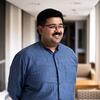What is your degree program, and can you briefly describe the chain of events that led you to graduate school at Temple?
I'm pursuing a PhD in communication. I have a bachelor's in biochemistry, and I started in biotech after college—working in a sub-basement with yeast for a while, doing things that, in the long term, were pretty interesting but ultimately not fulfilling, even though the pay was good. I considered getting involved in politics, so I moved to DC and worked in the federal government for a bit. While doing that, I earned a Master of Public Health. I later moved back to Ohio to be close to my parents and worked for a county health department in rural Ohio. That was a great experience, but it was also a very under-resourced area.
Parallel to all this, my wife started pursuing her graduate degree in Manhattan. I wanted to be closer to her but didn’t want to pay Manhattan prices, so I moved to Philadelphia. That’s how I got involved with Temple’s College of Public Health—my background was a good fit for a couple of research labs. While working there, I started taking classes for free using staff tuition remission. One thing led to another, and I found the Communication department.
Why did you pursue graduate study in Philadelphia? What do you enjoy about studying in the city?
I’ve lived in a few different cities—Berkeley, DC, Cleveland, and a couple places in India. Philadelphia reminds me of some of the places in India where I grew up, where multiple historical and cultural layers coexist. You find people who are very analog and low-tech, as well as early adopters and innovators. Philly also has this great sense of grit. It’s a big city with a lot going on, but it still feels like the kind of place where you can walk around and build meaningful community. I live in West Philadelphia right now, and I just love it. It feels warm and artistic—there’s always a new restaurant or coffee shop to explore. It’s a very vibrant place to be.
Can you tell us a little bit about your research?
My dissertation is about heuristics—mental shortcuts we use when making decisions, like gut feelings—and how they impact the way people process health information. For example, when a health department tells people to get vaccinated or exercise more, what kinds of gut feelings emerge that influence whether they listen or not? I used to work for a health department and was fascinated by why people wouldn’t take my advice.
I also study the rhetoric used by health departments and political institutions to persuade people—through printed materials, videos, or social media. My research agenda centers on whether or not institutions are persuasive, and why. It’s fascinating to me because people make meaning and decisions together. Once you dive in, it becomes a really deep area of study.
Can you tell us more about what you like about Temple?
I’ve been lucky to make a few great friends here—we hang out socially, go to H-Mart, get hotpot, or hit a bar. Typical PhD cohort activities. The faculty are also very collegial—it never feels hierarchical. I’ve even grabbed drinks with my advisor and just chatted. Some faculty come to grad student events, which helps create a great atmosphere.
When I started working at the College of Public Health, I was struck by how down-to-earth and warm everyone was. That definitely influenced my decision to stay for grad school. When I applied, Temple wasn’t the only place I got into, but I already felt like part of the Temple community.


